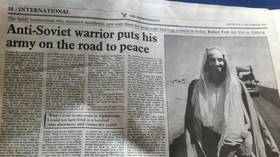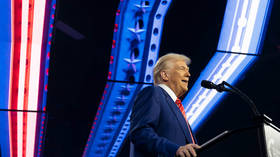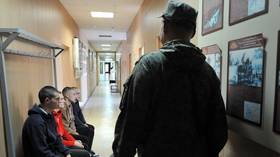Did Trump endorse Soviet intervention in Afghanistan… or disavow US backing of jihad there?

Offering an explanation of why US should withdraw from Afghanistan, President Donald Trump appeared to endorse the Soviet intervention there in the 1980s and by extension, disavow US support for jihadist insurgents.
“Russia used to be the Soviet Union. Afghanistan made it Russia, because they went bankrupt fighting in Afghanistan,” Trump told reporters on Wednesday, following a cabinet meeting at the White House.
Arguing that Russia, India and Pakistan were all in Afghanistan’s neighborhood and should fight terrorism there rather than expecting the US to, Trump offered an impromptu history lesson.
“The reason Russia was in Afghanistan was because terrorists were going into Russia. They were right to be there,” he said. “The problem is, it was a tough fight. And literally, they went bankrupt.”
Trump: "Russia used to be the Soviet Union. Afghanistan made it Russia because they went bankrupt fighting in Afghanistan. Russia."Trump then goes on to endorse the Soviet invasion of Afghanistan. Via Fox. pic.twitter.com/oE0fuDLXyz
— Kyle Griffin (@kylegriffin1) January 2, 2019
Trump’s apparent endorsement of the Soviet intervention did not sit well with his critics, who exploded in outrage and called it an abandonment of Ronald Reagan’s values and policies.
It seems impossible, but it's true: President Trump just endorsed the Soviet invasion of Afghanistan in 1979. Who's he working for? https://t.co/vRMfr3hQ8W
— David Frum (@davidfrum) January 2, 2019
In his rambling WH discourse, @POTUS just said regarding #Afghanistan that "the Russians were right to be there" -suggesting they were going after terrorists not, in fact, advancing their #EvilEmpire. This contradicts the assumptions of not only Reagan & Bush, but even of Carter.
— Michael Medved (@MedvedSHOW) January 2, 2019
"The reason Russia was in Afghanistan" was because of terrorism. "They were right to be there." (So, POTUS overlooks the USSR's communist invasion of Russia as part of Moscow's Iron Curtain foreign policy & offers the, presumably, Putin line on it was about terrorism.)
— David M. Drucker (@DavidMDrucker) January 2, 2019
In criticizing Trump’s comments, one NBC journalist even brought up the end credits of Rambo III, a 1988 American action movie dedicated to the “brave mujahideen fighters of Afghanistan.”
#historypic.twitter.com/E5WUue2bDS
— Benjy Sarlin (@BenjySarlin) January 2, 2019
That line of criticism seems ironic, however, given that the US sponsored the mujahideen – Islamic “holy warriors,” literally – against Afghanistan’s secular government prior to the Soviet intervention in December 1979. It was President Jimmy Carter who signed the directive to start aiding the mujahideen in July that year, on advice of his national security adviser Zbigniew Brzezinski.
The aid was going to induce a Soviet intervention, Brzezinski told the French magazine Le Nouvel Observateur in 1998. When Soviet troops crossed the border, Brzezinski said he wrote to Carter that the US had the “opportunity of giving to the USSR its Vietnam war.”
“Indeed, for almost 10 years, Moscow had to carry on a war that was unsustainable for the regime, a conflict that brought about the demoralization and finally the breakup of the Soviet empire,” he said in the interview.
It's crazy how Zbigniew Brzezinski took credit for creating the groups that later did 9/11 3 years before 9/11 in an interview for Le Nouvel Observateur. pic.twitter.com/i2hZrqfrls
— Grimace for Secretary of Defense (@JonEHecht) September 12, 2018
Careful observers will note that Trump’s version of history actually overlaps with this statement of Brzezinski’s, which has since become the conventional wisdom in Washington. The policy of aiding the mujahideen continued under Ronald Reagan, who sent money and weapons to Afghanistan, including anti-aircraft missiles. One of the recipients of this aid was Osama bin Laden, who led a contingent of Arab volunteers.
Aspiring holy warriors from many Muslim-majority countries went to Afghanistan to fight. They shifted the focus of their zeal to the West in the mid-1990s, after the government of president Najibullah was killed and Afghanistan plunged into chaos of civil war. In 1996, Bin Laden declared a holy war on the US.
About time a US president denounced the Brzezinski policy of supporting jihadis in Afghanistan. A truly catastrophic policy, not only for the USSR but for everyone else.
— George Szamuely (@GeorgeSzamuely) January 2, 2019
Asked about this in January 1998, Brzezinski was unapologetic.
“Regret what? That secret operation was an excellent idea,” he told Le Nouvel Observateur. “What is more important in world history? The Taliban or the collapse of the Soviet empire? Some agitated Muslims or the liberation of Central Europe and the end of the Cold War?”
By August that year, Bin Laden’s operatives would bomb the US embassies in Kenya and Tanzania. In October 2000, they would attack the destroyer USS Cole off the coast of Yemen. And in September 2001, they would destroy the World Trade Center and damage the Pentagon using three hijacked passenger airplanes.
None of it led to Brzezinski disavowing his comments from the 1998 interview, or expressing regret about getting the US to back Bin Laden and Afghan “holy warriors” in his personal jihad against the Soviet Union.
Think your friends would be interested? Share this story!












